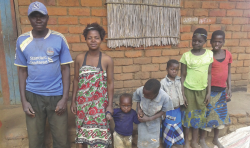Project helps African town to thrive

Patricia Lamitoni and her family, who have benefitted greatly from improved sanitation practices including regular use of the newly installed “tippy tap”.
Like most mothers, Patricia Lamitoni teaches her children to wash their hands every time they visit the toilet.
But only 12 months ago, Patricia, from Ntcheu, in Malawi, would not have considered this a priority, when she had mouths to feed.
Every day she would get up before dawn and head out to work to provide for her six children. She recounts that she would often return at the end of the day to find her children unwashed and wearing soiled underwear.
“The children often had acute diarrhoea,” she says. “There were times when it was only hardship, pain and agony. There was no escape. One of my children died. Slowly all the pains became normal.
“At night, sometimes the kids used to sleep before I fed them. It worried me when they fell asleep hungry and did not eat the food I prepared for them.”
It was the same story in many families in Patricia’s village. That’s when The Salvation Army entered into the situation, establishing a community-led Water, Sanitation and Hygiene (WASH) project in the area.
Developed through child-focused community development sponsorship, the program reflects the move away from traditional individual child sponsorship to projects and centres that enable children to thrive holistically and address the multiple needs of their whole community. In Ntcheu, empowering the community to build their own latrines reduced the risk of child illness and mortality rates.
At first, the setting up of a community committee to develop sanitation infrastructure in the village and become “open defecation free”, made no impact on Patricia or the lives of her children. Central to her concern was what she would feed her pigs, if her family no longer defecated in their pig pen (pigs in her community are commonly fed on faeces).
But through further understanding of alternative food sources for her animals, awareness-raising and education, Patricia agreed to build a toilet with support from the community committee and began to understand the vital importance of hygiene practices.
Like other families in her community, Patricia made a “tippy tap” which was hung outside her toilet for hand-washing. A tippy tap is made by plugging the neck of a plastic container with a piece of wood that has a small hole in it.
Tippy taps allow just a little water to flow each time they are tipped. A bar of soap is attached with string to prevent it from being lost or dissolving in water.
In the past 12 months, people in Ntcheu have been able to construct latrines in all of its 2337 households. The village was declared open-defecation free in March this year, organising its first sanitation festival for the occasion. The ceremony lasted a day with cultural shows, a sanitation facility demonstration, competitions, performance of songs and dance.
“I gained a lot of benefits from toilet use and good sanitation behaviour,” Patricia now says. “The kids are healthy and have almost no diarrhoea. Always they wash their hands after using the toilet.
“Also, we no longer let the pigs roam freely and they are healthier, too. As a mother I have a role in training my children to always wash their hands with soap.”
Salvos Sponsorship is run through The Salvation Army International Development Office (SAID) salvos.org.au/said.
this article first appeared in the February edition of Pipeline.
Comments
No comments yet - be the first.